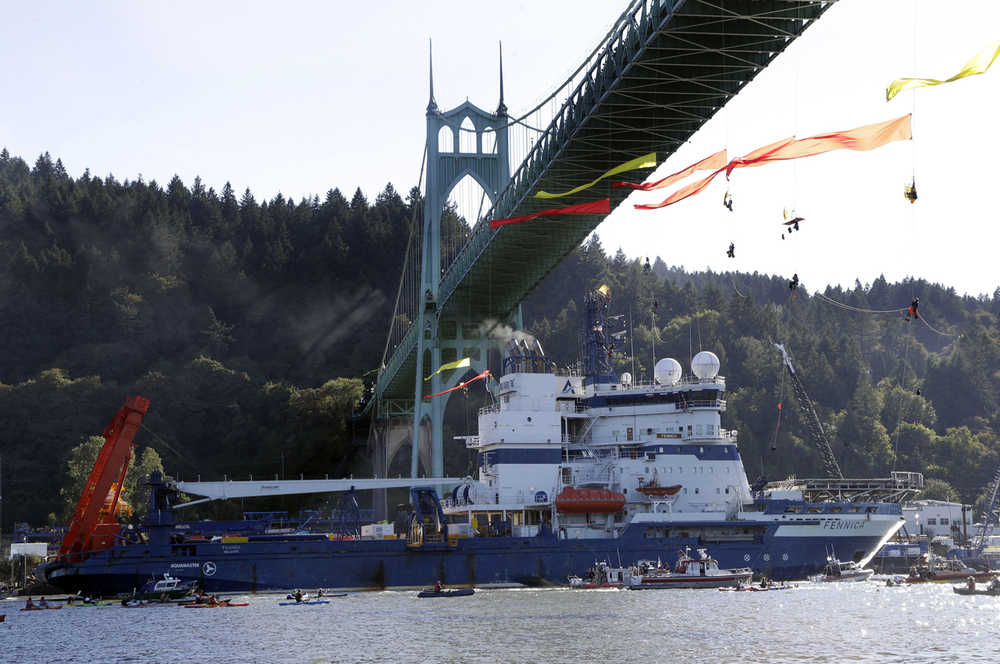ANCHORAGE — Critics of Arctic offshore petroleum drilling have used climbing gear, kayaks and polar bear costumes to protest industrial activity in the Arctic. They’re now trying humor.
Actors Alexander Skarsgard of “True Blood” and Jack McBrayer of “30 Rock,” along with Andy Bichlbaum of “The Yes Men”, are on a Greenpeace ship in the Greenland Sea with a team from the Funny or Die production company to make a comedy series focused on industrial threats to the Arctic.
“It’s really important that we reach as many people as possible with the message that the Arctic deserves our protection — it’s not just another resource to be exploited until it’s exhausted and broken,” Greenpeace Arctic campaigner Sune Scheller said by email Thursday from the Arctic Sunset, a 160-foot Greenpeace icebreaker.
Arctic waters, once mostly ignored, are attracting attention as summer sea ice has diminished, expanding opportunities for tourism, shipping and exploratory petroleum drilling. The National Snow and Ice Data Center on Tuesday said the Arctic hit its summer minimum last week with 1.7 million square miles of sea ice, down 240,000 square miles from 2014. It’s the fourth-lowest level on record for summer sea ice in September.
Environmental groups say burning oil extracted from the Arctic Ocean seabed will accelerate climate warming and that industrialization will harm polar bears, walruses, whales and ice seals.
Margaret Williams, Arctic program director for World Wildlife Fund, said Arctic awareness has increased as Americans experience extreme weather events.
“Increasingly, Americans understand that the impacts of the extreme weather events — drought and floods and crazy winter storms that they’re experiencing in the Lower 48 — are related to the changes in the Arctic,” she said.
The declaration of the polar bear as a threatened species in 2008 played a part, she said, as did worldwide photos of 35,000 walrus hauled out last September on a northwest Alaska beach because of a lack of sea ice.
Arctic issues reached an apex two weeks ago, she said, when President Barack Obama, on a trip to Alaska to draw attention climate warming, became the first sitting U.S. president to visit the Arctic. Eroding Alaska villages, he noted, were once protected by sea ice.
Critics of Arctic drilling, however, target the Obama administration for granting permits to Royal Dutch Shell PLC for exploration wells in the Chukchi Sea.
Scheller said Greenpeace is in the Greenland Sea to investigate seismic air guns used by the petroleum industry to explore for oil. Shell, Chevron, Statoil and other companies hold leases in the region.
“They’re basically firing very loud pulses at the seabed, trying to figure out where the oil deposits are located,” Scheller said. “These blasts are so loud that they can seriously injure whales and other ocean life. But right now they’re doing this without much public attention or scrutiny.”
Greenpeace has been tracking seismic vessels off Greenland since mid-August. Skarsgard, McBrayer and Bichlbaum came on board in mid-September.
Arctic drilling also has previously caught the attention of celebrity environmentalists.
Actor Ted Danson, a board member of ocean advocacy group Oceana, was in Alaska in 2010 filming the Drew Barrymore movie “Everybody Loves Whales.” He testified at a federal hearing and called for a pause in drilling plans. “Law and Order” star Sam Waterston, another Oceana board member, recently narrated a two-minute video on the risk of Arctic drilling that the organization has posted on its website.
Carolyn Prousky, head of public relations for Funny Or Die, said by email that the Arctic voyage comedy series will be short videos. She was not sure of the release date on the company’s platforms.
Shell officials have said repeatedly they have followed every requirement imposed by federal regulators and that drilling can be done safely in Arctic waters. The company is working to complete an exploratory well 70 miles off the Alaska coast and has assembled a flotilla of nearly 30 vessels that could respond to a spill.
In an interview this month, Marvin Odum, president of Shell Oil Co., said nothing will change the minds of some who protest Arctic drilling. He welcomes debate, he said, on how to drill safely but not illegal tactics that put protesters or workers in danger.

